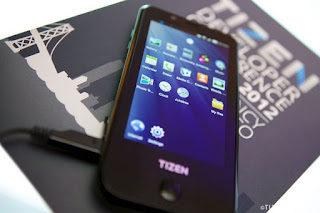Samsung's mobile platform, Tizen, is starting to show real results, surpassing BlackBerry OS in the market for mobile operating systems, and becoming the fourth largest OS behind Windows Mobile, iOS and Android. In a report provided by Strategy Analytics, Tizen and iOS have experienced the strongest growth, while Windows Mobile, BlackBerry OS, OS and Firefox have all lost market share. As for Android, the part of the OS remained stable.
See also: Tor Messenger, an anonymous cross-platform messaging application
For those unaware, is the Tizen own mobile platform Samsung, the firm develops as an alternative to Android. Samsung has worked on the platform in partnership with Intel for over two years and it became crucial for the South Korean firm to start reaping the fruits of his labor, which hitherto went almost unnoticed. This is an operating system based on Linux, which can run on a wide range of devices, such as smartwatches, smartphones, tablets and Smart TV.
While Tizen is an open source OS managed by the Tizen Association and the Linux Foundation, most of the products marketed today based on Tizen come from Samsung.
Samsung has launched two smartphones running Tizen, both available in South Asia, called the Z1 and Z3. The Z1 was launched earlier in the year to 84 dollars, which makes it very competitive compared to other Android smartphones. And this seems to have attracted crowds since Samsung claimed that Tizen is the second largest mobile platform on the entry-level market in India.
A wider launch soon
And Tizen could get another boost, since Samsung plans to launch smartphones running Tizen in 11 European countries by the end of the year. The success of smartphones in Europe could shape future plans for the Samsung OS. The Korean company could introduce the United States, another powerful market.
The market share is still below 2%, which means Samsung still has a lot of work before we can even think tickle Android. The company seems to focus on jogging Tizen its other devices, including Smart TV Gear and S2, to build an ecosystem for users.
It is also attractive for developers, since Samsung offers 100% of revenues from the application, which is much higher than the percentage of Google and Apple. Facebook was quick to jump on board, adding its official application and Messenger, WhatsApp and Instagram in less than six months.
See also: Tor Messenger, an anonymous cross-platform messaging application
For those unaware, is the Tizen own mobile platform Samsung, the firm develops as an alternative to Android. Samsung has worked on the platform in partnership with Intel for over two years and it became crucial for the South Korean firm to start reaping the fruits of his labor, which hitherto went almost unnoticed. This is an operating system based on Linux, which can run on a wide range of devices, such as smartwatches, smartphones, tablets and Smart TV.
While Tizen is an open source OS managed by the Tizen Association and the Linux Foundation, most of the products marketed today based on Tizen come from Samsung.
Samsung has launched two smartphones running Tizen, both available in South Asia, called the Z1 and Z3. The Z1 was launched earlier in the year to 84 dollars, which makes it very competitive compared to other Android smartphones. And this seems to have attracted crowds since Samsung claimed that Tizen is the second largest mobile platform on the entry-level market in India.
A wider launch soon
And Tizen could get another boost, since Samsung plans to launch smartphones running Tizen in 11 European countries by the end of the year. The success of smartphones in Europe could shape future plans for the Samsung OS. The Korean company could introduce the United States, another powerful market.
The market share is still below 2%, which means Samsung still has a lot of work before we can even think tickle Android. The company seems to focus on jogging Tizen its other devices, including Smart TV Gear and S2, to build an ecosystem for users.
It is also attractive for developers, since Samsung offers 100% of revenues from the application, which is much higher than the percentage of Google and Apple. Facebook was quick to jump on board, adding its official application and Messenger, WhatsApp and Instagram in less than six months.


